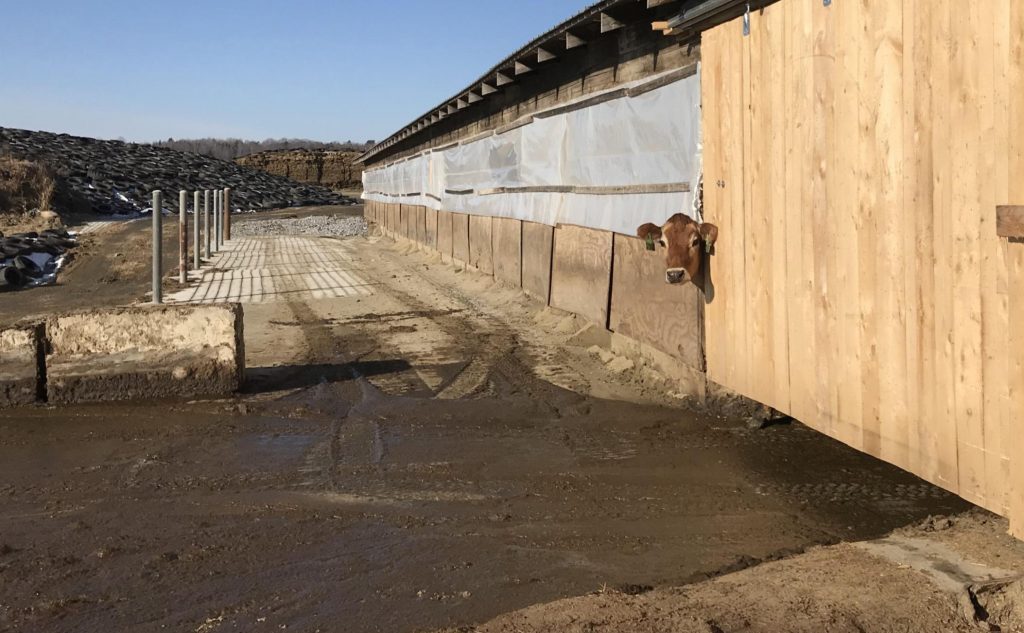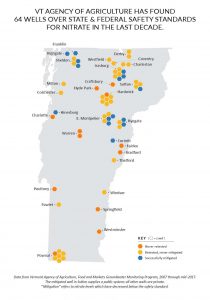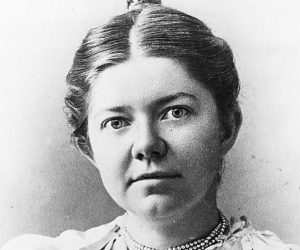Episode 76: Going to the Well

This was a big week in weed: we catch up on the news around New England, and hear the story of a puzzled cancer patient trying to figure out how to manage the side effects of chemo with cannabis. Also, an investigation into water contamination in Vermont wells near farms reveals a shocking shortage of oversight by the government agency in charge of agricultural pollution. In the wake of a cold snap and flood-inducing “bomb cyclone,” we parse the difference between climate and weather. Plus, we’ll visit a driving school designed for New England winter, and explore the legacy of the first American woman to write a symphony.
Even the Weather is Political

Vermont Governor Phil Scott, a Republican, has said he will sign new marijuana legislation, calling it a “libertarian approach” to legalization. (Angela Evancie/VPR)
There was big news this week about marijuana — both here in New England and in Washington. On Wednesday, Vermont became the first state to legalize recreational marijuana through the legislative process.
Other states including Massachusetts and Maine have legalized cannabis through ballot questions. Both of those states have been slowly working on legislative fixes to their laws that will allow for retail sales and taxation.
In Connecticut, where medical marijuana is legal, the Department of Consumer Protection announced this week that it will award three new licenses to dispensaries.
But marijuana is still illegal under federal law. And hanging over all of this news is United States Attorney General Jeff Sessions’s announcement that he will rescind an Obama-era policy against enforcing the federal law criminalizing the drug. Sessions has given prosecutors in those states discretion to prosecute violators, and the top federal prosecutor in Massachusetts said that he can’t promise to take a hands-off approach to legalized marijuana.
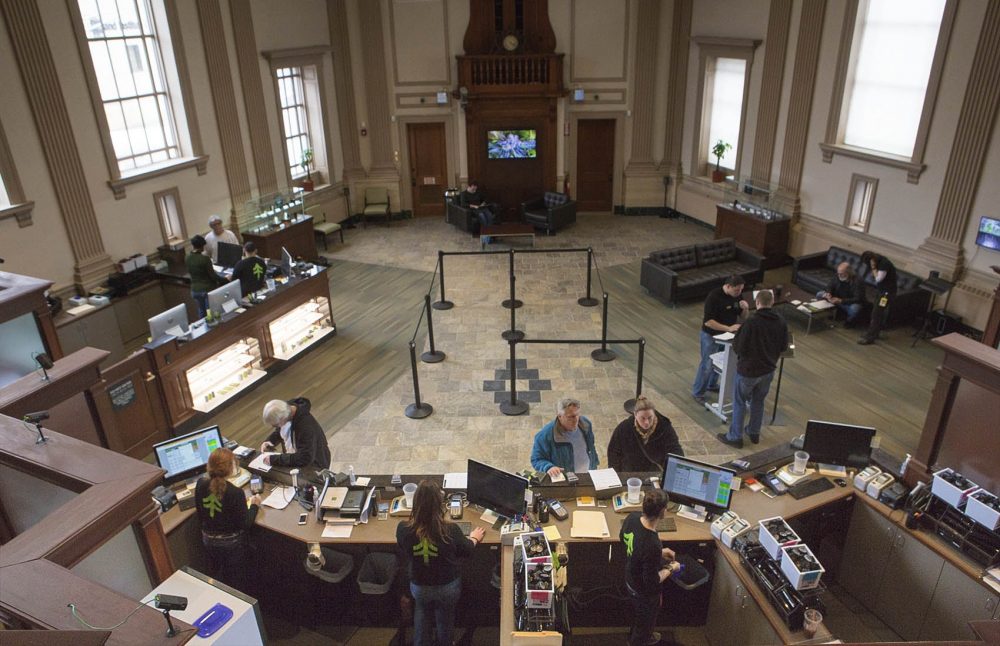
New England Treatment Access, in a former branch of Brookline Bank, is seen in February 2016. (Jesse Costa/WBUR)
So, where does this leave people who want to use the drug legally, either for recreation or for medicine?

Kate Murphy felt frustrated by what she sees as a lack of guidance from doctors on how to use medical marijuana to mitigate the impact of side effects related to her cancer treatment. (Jesse Costa/WBUR)
A 2017 study in Washington State, where cannabis is legal even without a prescription, found that a quarter of cancer patients use pot to help with physical and psychological symptoms.
As WBUR’s Karen Weintraub reports, large numbers of cancer patients in Massachusetts are also turning to cannabis. Weintraub introduces us to Kate Murphy, a breast cancer patient who found relief from the nausea of chemotherapy in medical marijuana for more than four years. But her story reveals a stunning lack of medical supervision over the type and dosage of the drug that patients are using.
As all of New England was gripped with record setting cold temperatures over the last few weeks, you may have been wondering: “will it ever be warm again?” But that cold snap also prompted a flood of social media posts from climate-change doubters, including the president.
The reply below others like it included an image from a visualization tool called the Climate Reanalyzer, which was created at the University of Maine’s Climate Change Institute. It shows much of the eastern U.S. and Canada blanketed with colder than normal temperatures, and the rest, alight with red, showing temperatures above normal.
Actually I’m pretty sure Antarctica shouldn’t be warmer than us soooooo pic.twitter.com/YwQeC9h4KW
— Nate Heroux (@nateherouxmusic) January 2, 2018
We wanted to learn more about this tool and what it can tell us about the realities of climate. So we turned to its creator, Sean Birkel, Maine State Climatologist and Research Assistant Professor at the Climate Change Institute, University of Maine.
Not Your Grandmother’s Dairy
We’ve reported here on how nutrients like phosphorus and nitrogen run off from farms into bodies of water — causing algae to bloom and fish to die from lack of oxygen. But these chemicals can also cause problems for humans when they leech into our drinking water.
One such contaminant is nitrate — a nitrogen compound found in manure and fertilizer. Nitrate in drinking water can be fatal for babies who drink it and may be carcinogenic.
When nitrate is found in public drinking water, federal law requires state regulators to notify residents. But in Vermont, 40 percent of residents have private drinking wells. And when farm runoff contaminates those wells with nitrate, the government body tasked with enforcement — in this case the Agency of Agriculture – says it can’t notify the community.
Our guest, Vermont Public Radio investigative reporter Emily Corwin, uncovered inconsistent, often undocumented state response to nitrate contamination in private wells. It’s a complex issue, and we highly recommend reading Corwin’s report.
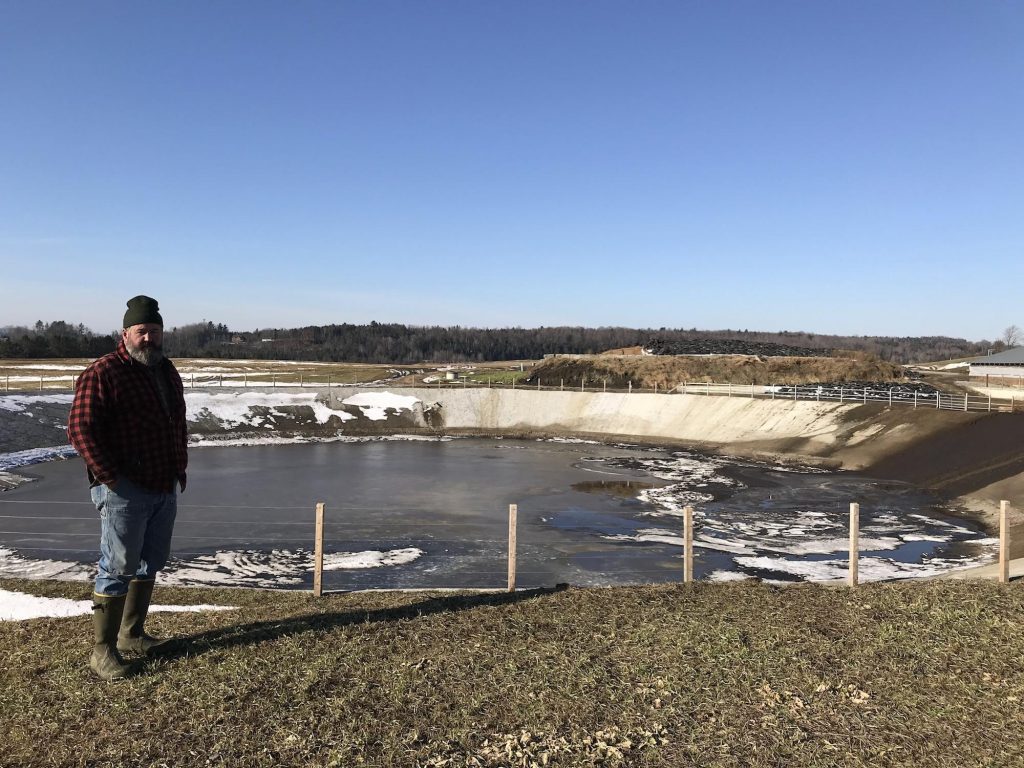
John Laggis stands beside a new manure storage pit on his dairy farm in East Hardwick, Vermont. Though Laggis’ farm is in compliance with environmental regulations, his neighbors believe manure from the dairy is the source of nitrate contamination in their well. (Emily Corwin/VPR)
Much of the hard work on Vermont’s dairy farms is done by migrant farmworkers — many of them undocumented. There’s been a new anxiety among those workers and the farmers who employ them, since sweeping changes to immigration policy made by President Trump a year ago. For the first time since 2010, arrests and detentions by the United States Border Patrol increased in Vermont, New Hampshire, and northeastern New York last year.
VPR’s John Dillon went to a recent gathering of Mexican workers in Middlebury, to find out how life has changed in the first year of the Trump Administration.
Be Safe Out There
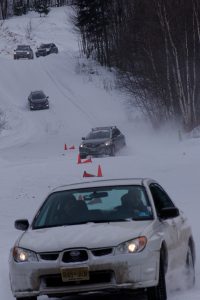
A student drives with an instructor during a one-day winter driving course at the Team O’Neil Rally School in Dalton, Nh. (Chris Jensen/NEXT)
You’ve probably said it to yourself this winter: “It’s New England — why can’t anyone drive in the snow?” In Dalton, New Hampshire, racer Tim O’Neil converts his 600-acre rally driving school into a place where everyday drivers can learn to maneuver on snow and ice. Reporter Chris Jensen went for a ride.
Composer Amy Beach was born in Henniker, New Hampshire in 1867. By the time she was 29 she was famous the world over for being the first American woman to write a symphony.
To celebrate the 150th anniversary of her birth, the University of New Hampshire has been honoring Amy Beach with a series of special performances. New Hampshire Public Radio’s Sean Hurley recently visited the school to learn more about the composer and her music.
About NEXT
NEXT is produced at WNPR.
Host: John Dankosky
Producer: Andrea Muraskin
Executive Producer: Catie Talarski
Contributors to this episode: Karen Weintraub, Emily Corwin, John Dillon, Chris Jensen, Sean Hurley
Music: Todd Merrell, “New England” by Goodnight Blue Moon.
We appreciate your feedback! Send praise, critique, suggestions, questions, story leads, and winter driving tips to next@wnpr.org.

